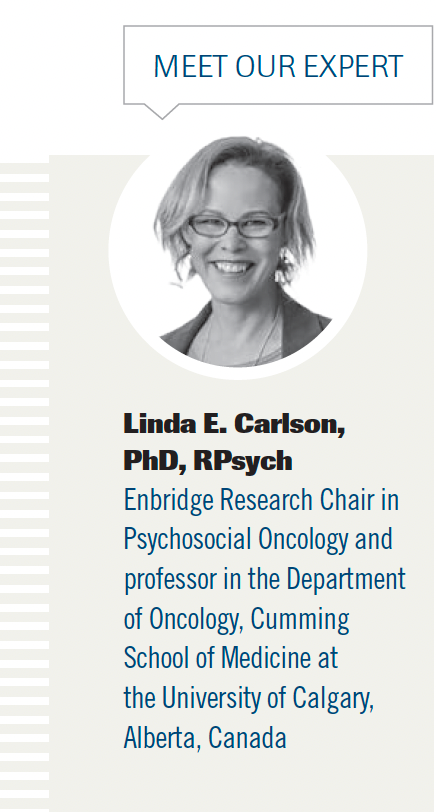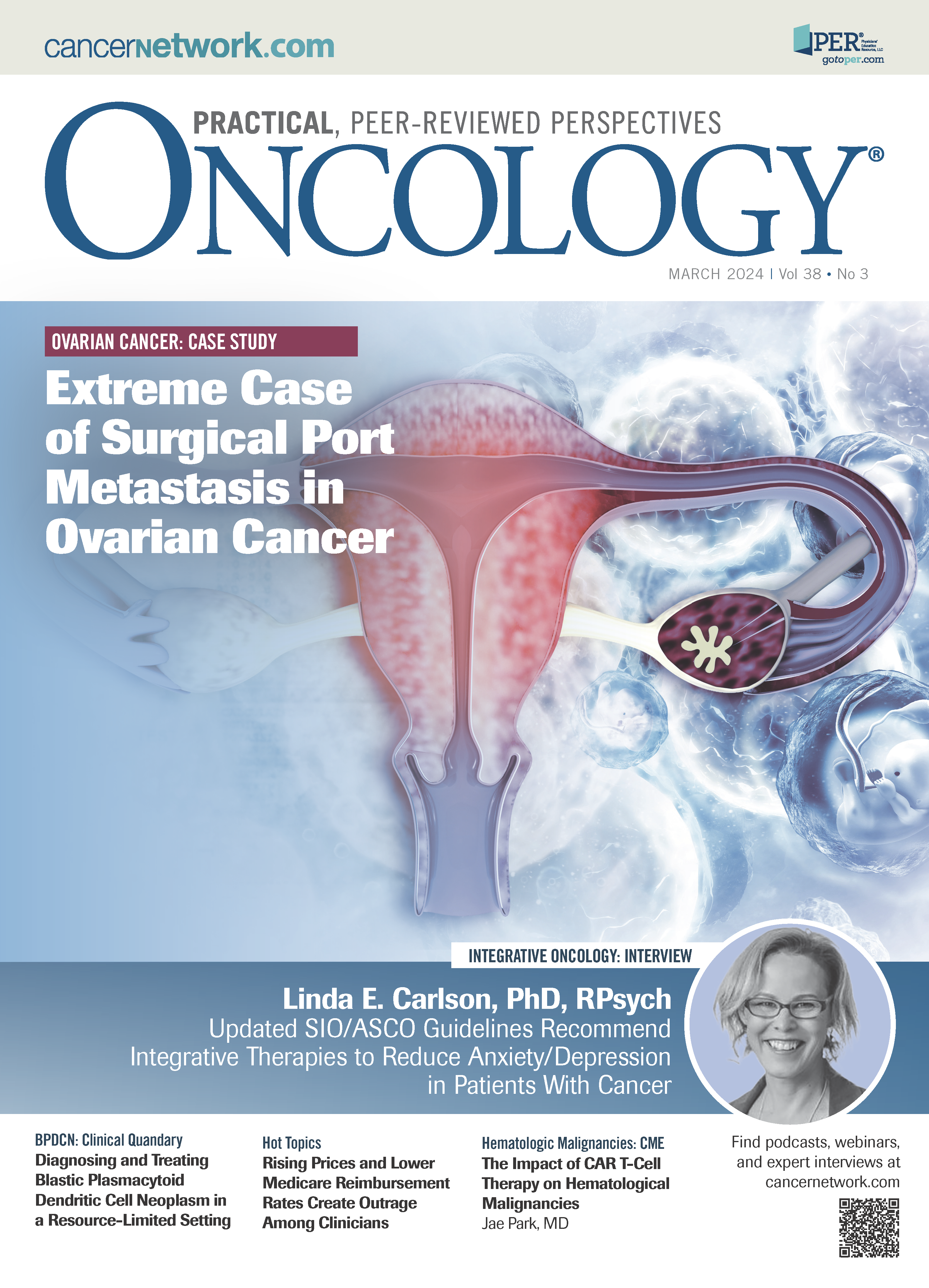Updated SIO/ASCO Guidelines Recommend Integrative Therapies to Reduce Anxiety/Depression in Patients With Cancer
Linda E. Carlson, PhD, RPsych, discusses the recent updates from SIO/ASCO to the anxiety and depression guidelines for patients with cancer.
Linda E. Carlson,
PhD, RPsych
Enbridge Research Chair in
Psychosocial Oncology and
professor in the Department
of Oncology, Cumming
School of Medicine at
the University of Calgary,
Alberta, Canada

Integrative therapies have been proven to help reduce the adverse effects (AEs) of anxiety and depression in patients with cancer, according to Linda E. Carlson, PhD, RPsych.
Carlson, Enbridge Research Chair in Psychosocial Oncology and a professor in the Department of Oncology, Cumming School of Medicine at the University of Calgary, Alberta, Canada, explained how different therapies, such as mindfulness-based interventions, yoga, and relaxation, could work in managing anxiety and depression in patients with cancer. Specifically, she talked about the new recommendations published by the Society for Integrative Oncology (SIO) in partnership with the American Society of Clinical Oncology (ASCO), which highlight integrative approaches to managing anxiety and depression AEs.1
Carlson is a past president of SIO and an editorial advisory board member of ONCOLOGY. During the interview, Carlson discussed the current guidelines, which the recommendations clinicians can begin to use in everyday practice, and what aspects future research should address.
Q: Why it is important to be aware of integrative approaches for the treatment of anxiety and depression in patients with cancer?
Carlson: The first thing to understand is how frequent and common these AEs are. Many patients with cancer will [experience] high levels of anxiety and depression that extend well past treatment and into their period of survivorship. We know that anxiety and depression can interfere with [patients’] quality of life and even affect their treatment outcomes. It’s important to have evidence-based treatments to help with these AEs. [In terms of] integrative therapies, these will include mind-body therapies, natural health products and physical therapies, and acupuncture. There’s mounting evidence that these kinds of therapies can be helpful for dealing with these burdensome AEs of anxiety and depression. It’s time to put together a guideline that can provide some guidance for clinicians around which integrative therapies are useful for patients with cancer and when.
Q: What was the multidisciplinary approach used to create these guidelines?
Carlson: We use a rigorous systematic approach to writing guidelines that ASCO typically uses for its conventional mainstream guidelines. There was a panel of 16 experts convened from a variety of different backgrounds, [including] medical oncology, radiation oncology, palliative medicine, psychosocial oncology, integrative therapies, and people who are experts in natural health products and music therapy. We also had methodologists and biostatisticians who helped systematically review the literature of all the clinical trials in this area of integrative therapies for treating symptoms of anxiety and depression. Then we went through them in a systematic way to review the evidence and come up with recommendations.
Q: Please discuss the recommendations outlined in this article.
Carlson: There were over 400 different randomized controlled trials that we looked at. The recommendations were broken down into the following: anxiety during treatment and post treatment, and depression during treatment and post treatment. The strongest recommendations across both anxiety and depression, both during and after treatment, were for mindfulness-based interventions. The research has looked at multiweek programs, so 4 to 8 weeks, and group sessions, so groups of patients with cancer. They get training in mindfulness meditation and gentle yoga, and there’s group discussion and support around maintaining regular meditation practice. Patients are assigned regular daily practice of meditation during these mindfulness-based interventions. They’re based on a program called Mindfulness-Based Stress Reduction that many people are aware of from Jon Kabat-Zinn, PhD.2 There are many adaptations that have been used for people with cancer. These mindfulness training programs are helpful for reducing both anxiety and depression, both during and after treatment. That’s one of the strongest recommendations.
Another recommendation is for yoga, specifically more traditional yoga programs where people are doing different postures or asanas. Similarly, these are usually multiweek programs where a group of people do yoga training once or twice a week. There’s less home practice with that. These yoga programs can be helpful for both anxiety and depression. Most of the research in that area has been with women with breast cancer, so the recommendations are stronger there. It doesn’t mean it won’t work for other patients; it just hasn’t been studied as much.
During treatment, [there is a recommendation for] relaxation and imagery, or the idea of relaxing the body using pleasant images to bring [about] a state of physiological relaxation. Hypnosis is helpful, specifically during procedures, to reduce anxiety. Music therapy, either working with a music therapist or listening to or making music, can also help reduce anxiety. Reflexology is using pressure points either on the feet or the hands to work with the nervous system to reduce levels of physiological arousal of anxiety. The last one I would add is posttreatment [recommendations for] tai chi and qigong interventions. They both come from traditional Chinese medicine, and they’re both physical, slow, meditative movement sequences coupled with specific breathing exercises. Those kinds of interventions can also be helpful.
Q: How can clinicians begin to implement these updated guidelines into their practice?
Carlson: The No. 1 thing that clinicians can do is be aware that these are options for people. Many patients prefer a nonpharmacological and nondrug alternative to treating anxiety and depression. Often, patients will be handed a prescription for an antidepressant or a sedative, and that’s not the best first-line treatment. I should also point out as an aside, there’s a companion guideline that ASCO published around the same time on mainstream treatments for anxiety and depression in patients with cancer.3 That covered things like cognitive behavior, therapy, exercise, and other interventions that are helpful. It might be good to look at that as well. In that guideline, it clearly states that first-line treatments are behavioral; they’re not pharmacological. Which behavioral treatment and integrative therapy are up to the individual and what their personal preference is. Mindfulness-based interventions are available in person in many locations, but there are also online programs. Some apps are available and have been studied that can be helpful.
For the clinician, [it’s important to understand] that these options are available and they’re evidence based. Then [it’s important to figure] out where in your local area these treatments are available. Many comprehensive cancer centers have integrative therapies; they have yoga, tai chi, mindfulness-based interventions, relaxation, and imagery. Many counselors can offer those services and cognitive behavioral therapy. Being aware that [these options are] effective and that they are first-line treatments, finding out where they’re available, knowing how patients can access them, facilitating the treatments in whatever way [clinicians] can, and advocating for more of these programs within cancer treatment centers will be important.
Q: Have integrative approaches become more common in the practice of mitigating anxiety and depression regarding cancer treatment?
Carlson: Absolutely. The numbers show that when you survey patients with cancer, half of them have used some form of complementary therapy since their diagnosis. Besides natural health products, such as herbs and supplements, the mind-body therapies are the most popular. [Already there are] many people doing this. In general, in the United States, the usage of yoga and meditation is quite popular across the population. It’s a little higher in people dealing with health conditions. There are many people out there using these therapies; they’re interested in them and they’re asking about them. Now that we have strong evidence that they’re effective for helping with anxiety and depression, that will just increase.
Q: What are the next steps for researching integrative practices for patients with anxiety/depression symptoms?
Carlson: There are quite a few therapies that people are interested in that aren’t included in the recommendation because there’s not enough evidence: massage, light therapy, energy therapies, and dietary supplements. There’s a lot of interest in psychedelics, like psilocybin, as well. We don’t have those in the recommendations because there hasn’t been enough research. We also need to look at different types of cancers, not just women with breast cancer. We need to look at men. We need to look at less common cancers. We need to look at people who are not [White] and highly educated, because much of the research is in those populations. We need to look more diversely at the population, not just at academic medical centers but in the community. [We need to look] at different community groups, consider issues of health equity and access to these therapies, and make them more accessible to people broadly. There’s still a lot of work to do.
Q: Is there anything else that you would like to add?
Carlson: The patients themselves play an important role in improving and ensuring access to these therapies and advocating for their cancer treatment teams to make these available. In many cases, patients wield a lot more power than clinicians within the system. If the patients are demanding them and saying, “There’s evidence and there are recommendations from ASCO and SIO saying that these are going to help me with my anxiety and my depression,” that can go a long way to making these more accessible.
The psychosocial piece is huge for patients. They say, “I don’t want to just be cured of my disease; I want to have a good quality of life. I want to feel healed. I want to feel like a whole person. I want to be able to have a life beyond cancer.” That’s such a big piece of the cancer
experience that often gets overlooked.
References
- Carlson LE, Ismaila N, Addington EL, et al. Integrative oncology care of symptoms of anxiety and depression in adults with cancer: Society for Integrative Oncology–ASCO guideline. J Clin Oncol. 2023;41(28):4562-4591. doi:10.1200/JCO.23.00857
- Everyday mindfulness with Jon Kabat-Zinn. Mindful. February 11, 2021. Accessed January 22, 2024. http://tinyurl.com/yrp6xput
- Andersen BL, Lacchetti C, Ashing K, et al. Management of anxiety and depression in adult survivors of cancer: ASCO guideline update. J Clin Oncol. 2023;41(18):3426-3453. doi:10.1200/JCO.23.00293

Newsletter
Stay up to date on recent advances in the multidisciplinary approach to cancer.
The Proper Ways to Identify and Use ADCs in Breast Cancer Subtypes
June 29th 2025Deciding when to use immunotherapy and how to utilize antibody-drug conjugates are complicated processes that require multidisciplinary collaboration to ensure that all patients with breast cancer receive appropriate and efficient care.
SIO/ASCO Guidelines for Integrative Therapies to Manage Anxiety/Depression
January 29th 2024Therapies like yoga, music therapy, acupuncture, and natural health remedies have proven to be beneficial in mitigating anxiety and depression in adults with cancer, according to Linda E. Carlson, PhD, RPsych.